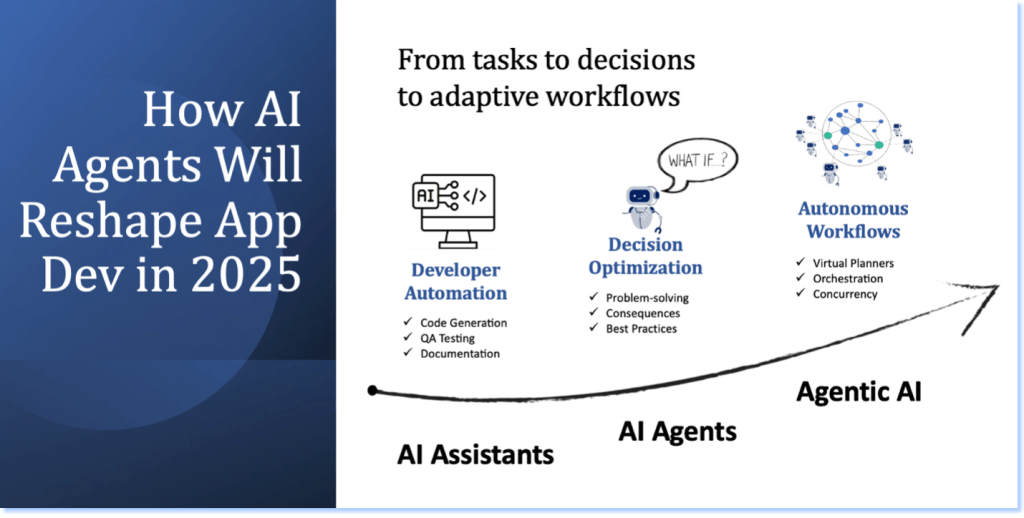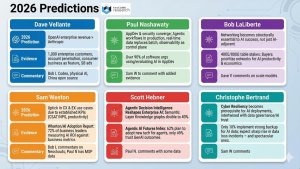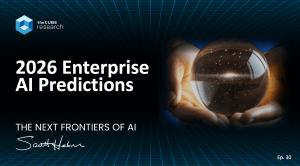The integration of artificial intelligence (AI) into application development and DevOps is set to revolutionize the way software is built, deployed, and maintained. As we begin 2025, we continue to expect AI to significantly impact various aspects of these fields, especially with the emergence of AI agents and agentic systems.
In this research note, we’ll explore:
- The impact of AI Assistances and agents
- The transformational nature of agentic AI
- Augmenting AppDev Skills with data science skills
- How AI is enhancing developer productivity
- The transformation of DevOps with AI
- Ethical considerations and challenges
- Enhanced developer productivity
Watch the Podcast
AI Assistants Are Now Foundational
AI coding assistants have rapidly become a foundational part of today’s application development teams, and their adoption is growing among developers. According to a GitHub survey, over nine in ten developers have used AI coding tools at work, while a CodeSignal survey found that eight in ten actively rely on these assistants.
AI assistants, anchored in generative AI, help developers execute tasks, retrieve information, and generate code. Developers benefit from building software faster, improving code quality, generating better test cases, and adopting programming languages faster, all translating to time savings for strategic tasks.
The consensus view analyzed by theCUBE Research indicates that some 30-50% of code is now being generated with the help of AI Assistants, mostly for repetitive tasks such as common functions, API templates, data structures, Q&A patterns, etc. In addition, assistants are playing an increasing role in exploring use case differentiators, user requirements, architectural best practices and even automating the publishing of documentation and user guides.
The Rise of AI Agents in App Dev
While AI Assistants have set a critical foundation in application development, most are now looking to scale productivity, creativity, and problem-solving. In 2025, we expect to see the rise of AI agents that will deliver higher-ROI use cases across the application development lifecycle. In fact, a Gartner Group projects that by 2028, 33% of enterprises will incorporate AI agents, growing from only 1% in 2024. This includes functions such as application development and IT operations.
AI agents promise significantly greater value than AI assistants. They can help developers do more than generate code; they can also help them achieve goals by interacting with a broader environment of considerations. AI agents can sense, learn, and adapt based on human and algorithmic feedback loops. Since they operate more autonomously, they can help developers make better decisions and automate planning without direct guidance on how to do so.
We expect to see a growing number of AI agents optimized for app development delivered into the marketplace in 2025. These agents will be designed to empower developers with new “superpowers” that help them plan more effectively, solve complex problems, and make better decisions throughout the application development lifecycle.

The Transformational Nature of Agentic AI
While AI agents will enhance an individual developer’s decision-making and problem-solving skills, Agentic AI employs a network of collaborating agents that promises to transform how entire application development teams achieve their goals more quickly, innovatively, and with higher quality. They do so by enabling multiple agents with their own sets of goals, behaviors, policies, and knowledge to interact guided by human developers. Think of the “wisdom of crowds,” where agents share knowledge, negotiate, cooperate, coordinate, or even compete to optimize outcomes based on their own datasets.
These networks of AI agents will revolutionize how app development teams collaborate, enabling them to achieve their collective goals more quickly and innovatively. These interconnected agents streamline communication, automate routine tasks, and dynamically adapt to changing priorities, allowing teams to concentrate on creativity and strategy. By collaborating throughout the development lifecycle, from ideation and coding to testing and deployment, AI agents significantly enhance a team’s ability to deliver new and improved applications precisely when users need them. This approach ensures quicker delivery of new value and innovations necessary to meet evolving user demands.
We believe that agentic AI systems will likely transform the application development lifecycle in the coming years as they mature to automate processes, enhance collaboration, and improve efficiency and quality. They will streamline ideation, planning, and requirements gathering with data-driven insights and natural language processing, while AI-powered tools optimize design, coding, and debugging. Testing will also become more robust with automated test case generation and performance monitoring, and deployment will be simplified through AI-driven CI/CD pipelines and resource allocation. Post-deployment, AI agents will ensure proactive maintenance and user analytics, while documentation and collaboration are enhanced with automated summaries and updates.
The goal is to empower app development teams to focus on innovation and deliver higher-quality applications by enabling faster development cycles, improving decision-making, solving complex problems, and scaling their output. It’s about giving app development teams “superpowers” to achieve more, not about replacing developers.

Augmenting Developers with Data Science Skills
Another major benefit for developers of agentic AI advances will be their ability to more easily augment their skills in data science and AI app engineering. Industry pioneers are creating various new agentic systems designed in part to benefit application developers, such as Moveworks and causaLens.
For example, the capabilities introduced by causaLens’ AI agent platform promise to empower developers to easily acquire and integrate data science skills into their workflows, fundamentally transforming their roles in application development. These agents reduce traditional reliance on specialized data scientists by automating complex and time-consuming tasks such as data cleaning, feature engineering, exploratory data analysis, and causal AI inference. This democratization enables developers to save time and confidently build data-driven applications that leverage AI models more seamlessly, enhancing both the quality and speed of AI-infused application development cycles.
The platform’s multi-agent architecture allows developers to concentrate on innovation and strategic objectives while depending on specialized agents to manage various workflow stages, from crafting SQL queries to developing interactive app components. By tailoring agents to address specific business requirements, developers can quickly scale the delivery of new and upgraded applications while retaining full control and visibility over automation processes. This transition positions developers as key players in leveraging the value of AI-driven insights, effectively transforming them into data scientists, rather than merely developers.
To see a preview, click here.
AI-Enhanced Developer Productivity
AI is transforming the productivity of application developers, particularly by adopting generative AI coding assistants. Tools like GitHub Copilot and Tabnine enable developers to automate coding and debugging processes by generating code snippets and suggesting solutions to common programming challenges. As these tools evolve, they are expected to handle increasingly complex tasks, such as automating unit testing and code reviews, further streamlining the development lifecycle.
Generative AI (and AI agents) also enhances productivity by providing intelligent code completion and refactoring capabilities. These algorithms analyze existing codebases to identify potential bugs, suggest improvements, and recommend refactoring techniques, significantly reducing development time while improving code quality.
Additionally, AI can create personalized development environments by tailoring suggestions, documentation, and best practices to individual preferences, helping developers stay focused and efficient. Together, these advancements enable developers to deliver high-quality applications faster and more easily.
AI-Driven DevOps Transformation
Predictive DevOps plays a crucial role in modern software development. It bridges the gap between development and operations teams, facilitating faster and more reliable application delivery. However, the growing complexity of systems and the demand for rapid, seamless deployments make DevOps transformation essential. AI is revolutionizing DevOps by introducing predictive models, generative AI assistants, and intelligent agents that automate processes, enhance collaboration, and proactively address potential issues.
AI-powered predictive analytics are transforming DevOps by analyzing large datasets from logs, metrics, and alerts to identify potential issues before they impact users. This proactive approach minimizes downtime and ensures system reliability, enabling teams to address problems before they escalate. Additionally, generative AI assistants and agents are automating routine tasks such as infrastructure provisioning, deployment, and configuration management. By eliminating these repetitive workflows, DevOps engineers can focus on strategic initiatives like optimizing performance and strengthening system security.
AI is also improving collaboration between development and operations teams by eliminating communication barriers. AI-powered tools can interpret technical jargon, provide real-time insights into system performance, and promote a shared understanding of critical metrics and objectives. Together, these advancements help DevOps teams operate more efficiently, innovate more quickly, and deliver higher-quality applications with less operational friction. By integrating predictive AI models, generative assistants, and AI agents, DevOps is becoming more agile, scalable, and better aligned with the demands of modern application development.
Ethical Considerations and Challenges
While AI offers tremendous potential, it also raises critical ethical considerations that organizations must address when integrating it into application development and DevOps. As AI tools increasingly shape how applications are designed, developed, and deployed, it is essential to ensure their use aligns with principles of fairness, transparency, and accountability. A significant concern is algorithmic bias, where AI systems may inadvertently reflect or amplify biases present in the training data, leading to unfair outcomes. For instance, biased data could result in discriminatory decision-making in applications such as hiring platforms or credit scoring systems. Ensuring fairness necessitates rigorous auditing of AI models, diverse training datasets, and mechanisms to detect and mitigate bias.
Another challenge is maintaining transparency in AI-driven processes. Developers and users need to comprehend how AI systems arrive at their decisions, particularly in high-stakes applications where outcomes can impact lives or businesses. This requires the creation of explainable AI systems that enable stakeholders to trace and trust AI decisions. Furthermore, data privacy and security remain crucial, as AI often relies on large amounts of sensitive data to operate effectively. Organizations must ensure compliance with data protection regulations and implement robust security measures to protect user information.
Tackling these ethical challenges demands a multifaceted approach. Organizations must establish ethical guidelines for AI use, invest in workforce training to promote responsible AI practices, and cultivate a culture of accountability. Collaboration among developers, data scientists, ethicists, and policymakers is vital to navigating these complexities effectively.
In conclusion, while AI is set to transform application development and DevOps by automating routine tasks, enhancing collaboration, and improving decision-making, these advancements must be approached thoughtfully. Organizations must balance innovation with ethical considerations to ensure that AI tools maximize benefits while minimizing risks. By embedding ethics into the design and deployment of AI, businesses can create software that is not only efficient and powerful but also fair, transparent, and trustworthy.
2025 and Beyond
2025 promises to kick-start a transformational period in application development and DevOps as AI plays a larger and larger role.
As we look to the future, the convergence of artificial intelligence (AI) with application development (AppDev) and DevOps sets the stage for significant changes across industries. While AI holds immense promise for automation, productivity, and innovation, its implementation also brings challenges that organizations must address. Here’s a deep dive into how AI will reshape developer workflows, platform engineering, site reliability engineering (SRE), and broader application modernization efforts by 2025.
AI’s Impact on Developers: Redefining the Role
AI is revolutionizing software development by automating repetitive tasks and freeing up developers to focus on higher-value work. Tools like GitHub Copilot and Tabnine are already demonstrating the power of AI in generating code and debugging errors. By 2025, AI is expected to generate a significant portion of repetitive code, allowing developers to concentrate on innovative problem-solving and strategic decision-making.
Developers must adapt and acquire new skills as AI performs more routine tasks. In AI-driven environments, they will need to focus on creative problem-solving, effective collaboration, and ethical decision-making. This shift will require upskilling and continuous learning to remain competitive in the AI-augmented workforce.
The relationship between developers and AI is evolving. AI is no longer just a tool; it is becoming a virtual team member. AI agents can participate in workflows, suggest architectural designs, and identify potential risks. This collaboration between humans and AI will redefine the future of software development, leading to more efficient and innovative solutions.
Impacts on Platform Engineering
The DevOps landscape is undergoing a significant transformation, driven by the increasing adoption of unified platforms. By 2025, many enterprises are expected to consolidate their disparate tools into cohesive DevOps platforms. AI will be crucial in enabling these platforms to manage complex integrations, automate pipelines, and standardize practices across diverse environments.
AI-powered tools will revolutionize platform engineering by automating routine tasks such as provisioning, scaling, and configuration management. Predictive analytics will optimize resource allocation dynamically, ensuring optimal performance and cost-efficiency. This shift will allow platform engineering teams to focus on delivering value-added services rather than being bogged down by manual tasks.
AI will enhance governance and security by automating compliance checks and identifying potential risks. AI-driven systems will monitor platform usage patterns and enforce best practices, reducing the likelihood of security breaches and misconfigurations. This proactive approach will help organizations maintain a secure and compliant DevOps environment.
SREs: Evolving to AI-Enhanced Roles
AI is transforming the way SRE teams monitor and respond to incidents. By leveraging machine learning models, AI can proactively detect anomalies, predict potential failures, and even autonomously resolve minor issues. This shift from reactive troubleshooting to proactive monitoring will significantly improve system reliability and reduce downtime.
SREs will increasingly rely on causal AI to delve deeper into the root causes of incidents. By analyzing complex interdependencies between system components, AI can pinpoint the exact source of a problem and suggest effective remediation strategies. This will accelerate incident resolution and minimize the impact on users.
AI will also augment SRE teams by automating routine tasks such as log analysis. This frees up SREs to focus on higher-level tasks, such as resilience engineering and long-term performance optimization. By empowering SREs with AI, organizations can build more resilient and efficient systems.
Broader Impacts on Application Modernization Efforts
AI is revolutionizing how organizations modernize legacy applications, streamlining processes that once required significant manual effort. By analyzing legacy codebases, AI-powered tools can identify dependencies, detect inefficiencies, and recommend refactoring strategies. This automation accelerates the migration of applications to modern platforms, reducing downtime and ensuring smoother transitions to cloud-native architectures or microservices-based environments.
Beyond migration, AI is reshaping how applications are designed and architected. Intelligent tools can analyze business requirements and suggest optimal design patterns and technology stacks tailored to specific goals. These tools can also predict potential performance bottlenecks, enabling teams to address challenges proactively during the design phase. This reduces the risk of rework and ensures that applications are built with scalability and resilience in mind.
AI’s continuous monitoring capabilities further enhance application performance and security. By processing vast amounts of telemetry and behavioral data, AI can identify anomalies, detect vulnerabilities, and recommend or implement fixes before issues escalate. This proactive approach improves overall application quality, ensuring robust performance and fortified defenses against evolving threats. With these advancements, AI empowers organizations to modernize their applications faster, smarter, and more securely than ever.
- Accelerating Legacy System Upgrades
AI will play a critical role in modernizing legacy applications by automating code refactoring and suggesting optimal architectures for cloud migration.
Example: Tools like AWS Refactor Spaces or similar AI-driven platforms will analyze monolithic applications, identify bottlenecks, and recommend microservices-based redesigns. - Improved Decision-Making with AI Insights
Predictive and generative AI tools will help teams make informed decisions about application modernization strategies, prioritizing which applications to modernize first based on business impact.
- Enabling Citizen Developers
Low-code/no-code platforms powered by AI will democratize application development, enabling business users to participate in modernization efforts without heavy reliance on IT.
Example: Citizen developers will use AI-guided platforms to build front-end interfaces or automate workflows, reducing the burden on professional developers.
- Optimizing Costs and Performance
AI’s ability to recommend and implement optimizations for both code and infrastructure will reduce the cost of modernization efforts while improving application performance.
Strategic Recommendations for Organizations
As the world of application development and DevOps fuses with AI data science, the profession of building applications will transform into a new world in the years ahead. We believe the advent of AI-guided application development teams is inevitable as AI matures and organizations strive for achieving greater innovation and productivity.
The time is now to start preparing. We’d recommend you consider these Strategic Recommendations for your Organizations:
- Upskill Teams for AI Collaboration
Invest in training developers, platform engineers, and SREs to work effectively alongside AI tools, emphasizing skills in governance, complex problem-solving, and ethical AI practices. - Adopt Unified Platforms with Embedded AI
Choose DevOps platforms that integrate AI capabilities for automation, observability, and security. This will simplify operations and enhance scalability. - Embed Security Throughout the Pipeline
Prioritize AI-driven DevSecOps practices to address vulnerabilities and ensure compliance. - Leverage Low-Code/No-Code Platforms Strategically
Use AI-powered low-code solutions to expand development capabilities while maintaining strong governance and quality standards.
By thoughtfully integrating AI into AppDev and DevOps practices, organizations can unlock new efficiencies, enhance developer productivity, and accelerate application modernization. As we approach 2025, those who embrace these strategies will be well-positioned to lead in an increasingly AI-driven technological landscape.



